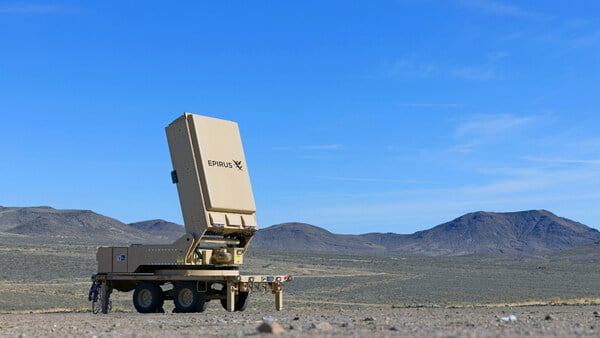Epirus’ Leonidas high-powered microwave pictured at a US authorities testing web site. (Epirus)
WASHINGTON — Epirus, a expertise firm creating directed-energy weapons, has gained a $66.1 million contract to ship 4 high-powered microwave prototypes to the Army for it to proceed testing out in opposition to swarms of aerial drones, the agency introduced at present.
The firm’s Leonidas system “outperformed” six different methods throughout varied take a look at occasions to win the Army’s sole-source contract for the Indirect Fire Protection Capability-High-Power Microwave (IFPC-HPM) at present managed by the Rapid Capabilities and Critical Technologies Office (RCCTO), an Epirus spokesman wrote in an e-mail to Breaking Defense. Although the corporate is simply underneath contract to ship 4 of these prototypes, he famous that that determine may go up on the Army’s discretion.
“This contract with the RCCTO brings new counter-swarm capability to the [unmanned aerial system] UAS fight with our cost-effective, modular and upgradable Leonidas systems,” the corporate’s Chief Executive Officer Ken Bedingfield stated in a press launch. “As the threat environment continues to evolve, so, too, will our capabilities, ensuring the US Army is equipped with effective countermeasures to near-term and over-the-horizon electronic threats for decades to come.”
The Army didn’t instantly reply to questions concerning the contract, IFPC-HPM take a look at plan or a future program. However, Army fiscal 2023 funds request paperwork present further particulars about plans to amass an IFPC-HPM, ground-based weapon to supply mounted and semi-fixed websites with a short-range protection in opposition to swarms of group 1 and a couple of aerial drones (sometimes weighing lower than 55 kilos). More particularly, the IFPC-HPM requirement features a high-power microwave supply, energy and thermal subsystem, and an antenna subsystem interoperable with a battle administration command, management and communication software program.
“IFPC-HPM provides much needed protection against adversarial UAS swarms capable of targeting and overwhelming US and allied air defense systems,” the Army wrote.
The Army is pursuing the weapon underneath an “accelerated material development and competitive prototyping” effort and stated it is going to produce 4 prototypes by 2024, take a look at them out after which transition to a program of document in 2025.
“IFPC-HPM will leverage US Air Force contracts to provide prototypes,” the Army wrote. “Soldier touchpoints will be conducted to provide feedback in support of Army requirements generation, prototype maturation, fielding residual combat capability to a unit of action, and future capability development.”
The IFPC-HPM initiative is just one half of a bigger directed vitality initiative that additionally contains the event of a 300 kilowatt-class laser underneath the IFPC-High-Energy Laser (HRL) effort and a 50 kilowatt-class laser underneath the Directed Energy Maneuver-Short Range Air Defense (DE M-SHORAD).
For Stryker-based DE M-SHORAD functionality, the Army needs to supply troopers with a brand new air protection functionality to down rotary wing plane, aerial drones weighing lower than 1,320 kilos, and rocket, artillery, and mortar threats. Kord Technologies is at present tasked with integrating the laser onto the fight automobile, and in 2021 the Army chosen Raytheon to supply the laser after Northrop Grumman dropped out.
However, weapon growth hit some pace bumps for the time being, and final 12 months Army officers determined to maintain the weapon in growth just a few months longer than initially deliberate. But if all goes in line with the brand new plan, the service will get up a platoon with 4 automobiles early this 12 months.
Looking down the highway, although, Raytheon just isn’t a lock for this system, and Army officers have stated they plan to host a future competitors for this system. Some firms have already introduced plans to compete for this coveted contract together with Lockheed Martin with its Directed Energy Interceptor for Maneuver Short-Range Air Defense System (DEIMOS) system. Just at present, the corporate introduced it had achieved first gentle from the DEIMOS system, which “verifies that the laser’s optical performance parameters align with the system design parameters.”
Lockheed now plans to increase the DEIMOS take a look at program this 12 months earlier than conducting discipline integration assessments in 2024.





